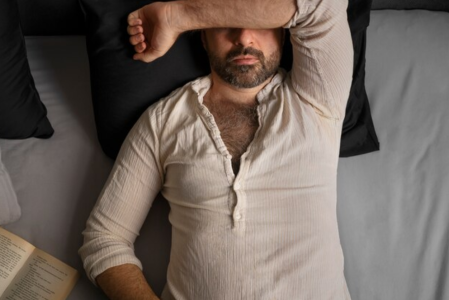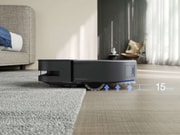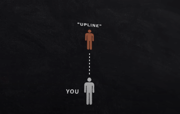Unlock the secret to perfect sleep with these tips from a sleep expert!
By
- Replies 1
Sleep is a vital part of our lives, yet it often eludes us when we need it the most.
Waking up in the middle of the night and struggling to fall back asleep is a common issue that can leave you feeling drained and unproductive the next day.
In fact, according to 2020 data from the Centers for Disease Control and Prevention (CDC), more than 17 per cent of adults had trouble staying asleep most days or every day of the past month.
In Australia, the situation is no different, with nearly half (48 per cent) of all Australian adults reporting at least two sleep-related problems, according to the Institute of Health and Welfare.
The issue is even more prevalent among older Australians.
A report by the SleepHealth Foundation found that 47 per cent of Australians aged 65 years and over reported waking up frequently during the night, compared to just 22 per cent of 18- to 24-year-olds.
This disruption in sleep can lead to an increased risk of chronic health conditions and risk factors, making it a significant concern for the senior population.
Dr Biquan Luo, a San Francisco sleep expert and CEO of LumosTech, a company that produces a smart sleep mask to promote healthy circadian rhythms, has shared some valuable insights on the reasons behind these sleep disruptions and how to handle them.
There are various reasons why people wake up at night. Stress and anxiety, discomfort or pain, and environmental disruptions such as noise, movement or temperature fluctuations can all contribute to sleep disruption.
Sleep disorders, such as sleep apnea or restless leg syndrome, can also cause people to wake up during the night.
‘Disruption of the body’s natural sleep-wake cycle can also lead to fragmented sleep,’ said Luo.
In Australian men, sleep apnoea is associated with an increased chance of chronic health conditions and risk factors.
When you wake up in the middle of the night, Luo suggests staying in bed at first, trying to relax and seeing if you can fall asleep again.
Techniques such as progressive relaxation, breathing exercises, and white noise machines can help you relax.
‘If you can’t fall back asleep after 10 or 15 minutes, it’s time to get out of bed,’ said Luo.
‘Try going to a quiet and comfortable place at home, like the couch, and engage in a quiet, low-stimulation activity, such as reading a book or doing a calming activity, until you feel sleepy again—then return to bed.’
Avoid the temptation to reach for your phone or look at the clock if your sleep is interrupted.
‘Checking the time can increase stress and make it harder to sleep,’ she noted.
‘Additionally, if you check the time on your phone, the contents of the phone may be too stimulating, which further prevents you from relaxing and falling asleep.’
Waking up in the middle of the night can be a result of your body’s internal clock misaligned with your sleep schedule and pattern.
‘Our sleep is governed by two key factors—early in the night, it’s the build-up of sleep pressure, our body’s need for rest, that helps us both fall and stay asleep,’ the expert said.
‘Later in the night, our internal clock, known as circadian signalling, plays a crucial role in maintaining sleep.’
In the best scenario, these two factors will work together to keep you asleep, Luo said.
‘But if sleep pressure fades before the circadian signal fully kicks in, it might lead to waking up at night,’ she said.
‘If you’re unsure why you’re waking up during the night, you may look into adjusting your internal clock to see if it helps reduce these interruptions.’
You can also adjust your circadian rhythm by waking up at the same time each day, using timed exposure to bright light or changing meal times.
Also, taking melatonin supplements, exercising at different times of day and consuming moderate amounts of caffeine in the morning can effectively recalibrate your circadian rhythm, according to the Sleep Foundation.
In conclusion, while sleep disruptions can be frustrating and detrimental to your health, understanding the causes and implementing strategies to combat them can significantly improve your sleep quality.
Remember, everyone is different, and what works for one person may not work for another.
Finding what works best for you may take some trial and error. If sleep problems persist, it may be worth consulting a healthcare professional or a sleep specialist.

What are your experiences with sleep disruptions? Do you have any tips or tricks that have worked for you? Share your thoughts and experiences in the comments below.
Waking up in the middle of the night and struggling to fall back asleep is a common issue that can leave you feeling drained and unproductive the next day.
In fact, according to 2020 data from the Centers for Disease Control and Prevention (CDC), more than 17 per cent of adults had trouble staying asleep most days or every day of the past month.
In Australia, the situation is no different, with nearly half (48 per cent) of all Australian adults reporting at least two sleep-related problems, according to the Institute of Health and Welfare.
The issue is even more prevalent among older Australians.
A report by the SleepHealth Foundation found that 47 per cent of Australians aged 65 years and over reported waking up frequently during the night, compared to just 22 per cent of 18- to 24-year-olds.
This disruption in sleep can lead to an increased risk of chronic health conditions and risk factors, making it a significant concern for the senior population.
Dr Biquan Luo, a San Francisco sleep expert and CEO of LumosTech, a company that produces a smart sleep mask to promote healthy circadian rhythms, has shared some valuable insights on the reasons behind these sleep disruptions and how to handle them.
There are various reasons why people wake up at night. Stress and anxiety, discomfort or pain, and environmental disruptions such as noise, movement or temperature fluctuations can all contribute to sleep disruption.
Sleep disorders, such as sleep apnea or restless leg syndrome, can also cause people to wake up during the night.
‘Disruption of the body’s natural sleep-wake cycle can also lead to fragmented sleep,’ said Luo.
In Australian men, sleep apnoea is associated with an increased chance of chronic health conditions and risk factors.
When you wake up in the middle of the night, Luo suggests staying in bed at first, trying to relax and seeing if you can fall asleep again.
Techniques such as progressive relaxation, breathing exercises, and white noise machines can help you relax.
‘If you can’t fall back asleep after 10 or 15 minutes, it’s time to get out of bed,’ said Luo.
‘Try going to a quiet and comfortable place at home, like the couch, and engage in a quiet, low-stimulation activity, such as reading a book or doing a calming activity, until you feel sleepy again—then return to bed.’
Avoid the temptation to reach for your phone or look at the clock if your sleep is interrupted.
‘Checking the time can increase stress and make it harder to sleep,’ she noted.
‘Additionally, if you check the time on your phone, the contents of the phone may be too stimulating, which further prevents you from relaxing and falling asleep.’
Waking up in the middle of the night can be a result of your body’s internal clock misaligned with your sleep schedule and pattern.
‘Our sleep is governed by two key factors—early in the night, it’s the build-up of sleep pressure, our body’s need for rest, that helps us both fall and stay asleep,’ the expert said.
‘Later in the night, our internal clock, known as circadian signalling, plays a crucial role in maintaining sleep.’
In the best scenario, these two factors will work together to keep you asleep, Luo said.
‘But if sleep pressure fades before the circadian signal fully kicks in, it might lead to waking up at night,’ she said.
‘If you’re unsure why you’re waking up during the night, you may look into adjusting your internal clock to see if it helps reduce these interruptions.’
You can also adjust your circadian rhythm by waking up at the same time each day, using timed exposure to bright light or changing meal times.
Also, taking melatonin supplements, exercising at different times of day and consuming moderate amounts of caffeine in the morning can effectively recalibrate your circadian rhythm, according to the Sleep Foundation.
In conclusion, while sleep disruptions can be frustrating and detrimental to your health, understanding the causes and implementing strategies to combat them can significantly improve your sleep quality.
Remember, everyone is different, and what works for one person may not work for another.
Finding what works best for you may take some trial and error. If sleep problems persist, it may be worth consulting a healthcare professional or a sleep specialist.
Key Takeaways
- Dr Biquan Luo, a sleep expert, has shared tips to achieve uninterrupted sleep and addresses common disruptors like stress, discomfort, and environmental factors.
- Nearly half of Australian adults report having at least two sleep-related problems, with seniors experiencing more disruptions compared to younger individuals.
- To handle midnight awakenings, Dr. Luo recommends techniques such as progressive relaxation and advises against checking the time or using a phone.
- Adjusting one's internal clock through consistent wake-up times, light exposure, and other methods may help align sleep pressure and circadian signals for better rest.
What are your experiences with sleep disruptions? Do you have any tips or tricks that have worked for you? Share your thoughts and experiences in the comments below.








